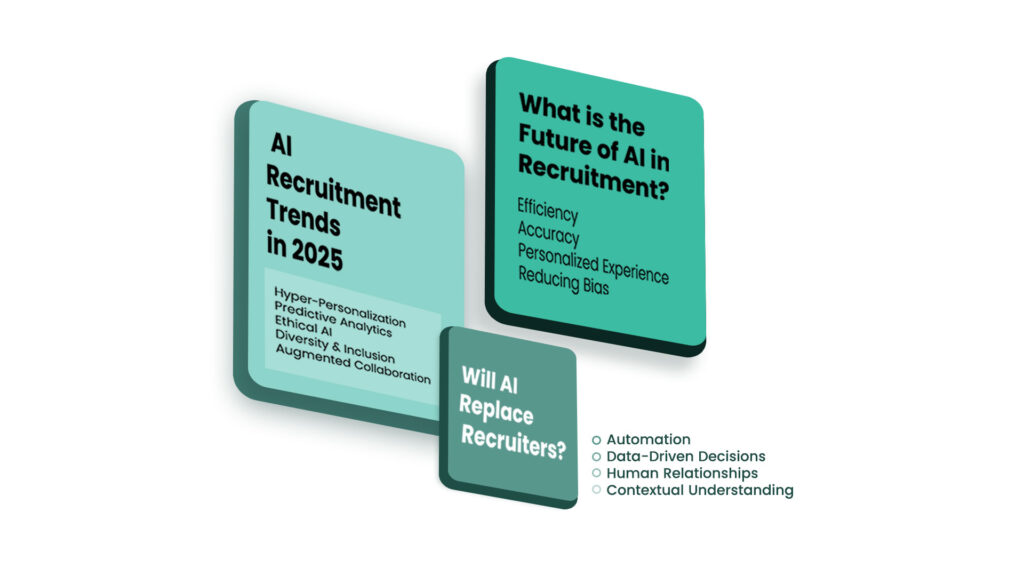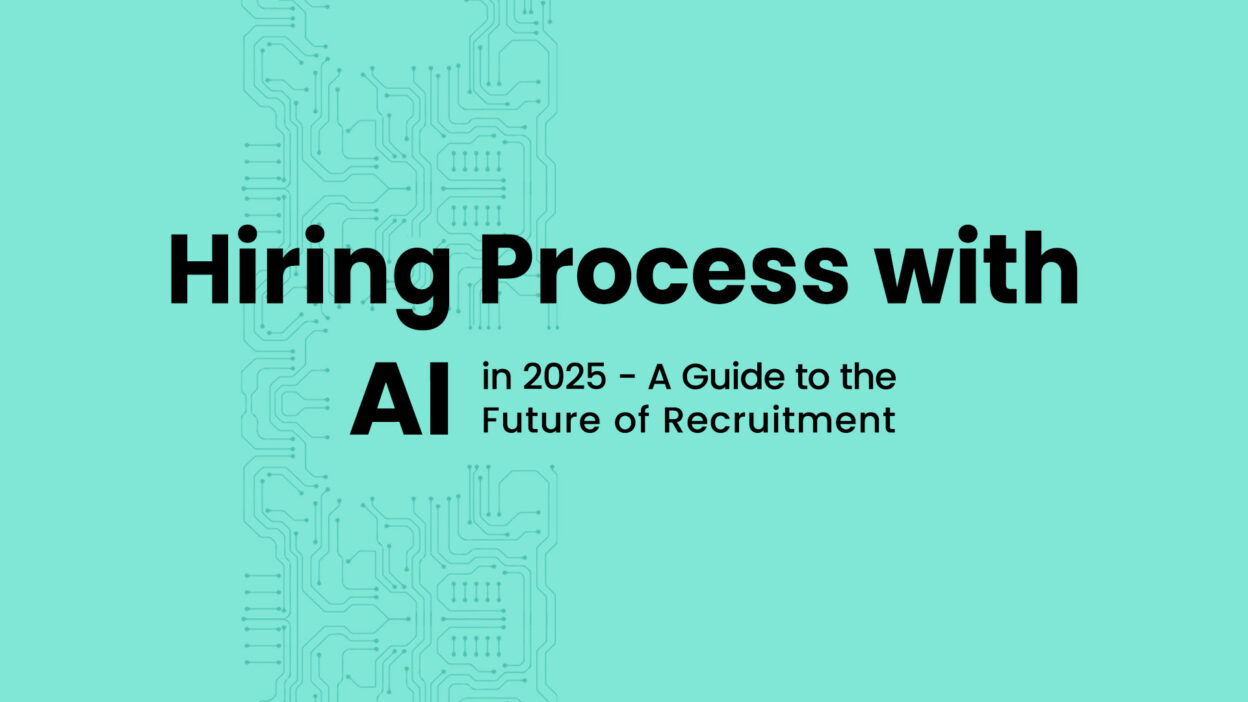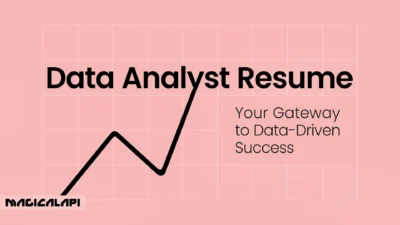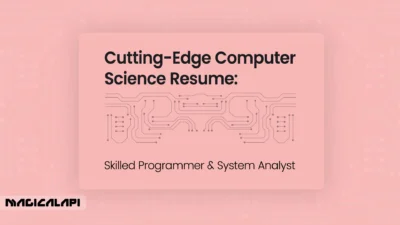At the heart of the fast-changing recruitment landscape is artificial intelligence. Since it has become difficult for companies to attract top talent in a competitive market, AI is changing the dimensions of hiring decisions. This guide explores the Future of AI in recruitment 2025, adoption of AI in recruitment in 2025, discussing the latest trends, its impact on traditional hiring processes, and how it could reshape talent acquisition strategy.
Table of Contents
What is the Future of AI in Recruitment?
AI has emerged as the cornerstone of modern hiring, streamlining processes to a whole new level, upgrading decision-making, and improving candidate experiences. For 2025, AI is expected to:
- Enhance Efficiency: AI-powered tools can process large volumes of data in record time, surfacing suitable candidates in a fraction of the time it would take a human recruiter.
- Improve Accuracy: Advanced algorithms analyze resumes, skill assessments, and job performance with better precision.
- Personalized Experience: AI enables personalization in communication and engagement with candidates, tailoring experiences to the specific needs and preferences of each candidate.
- Reducing Bias: AI can make recruitment fairer by making decisions based on skills and qualifications rather than subjective factors.
In the future, AI will not replace human recruiters but will enhance their capabilities to make better, faster, and more informed decisions. In this evolving landscape, leveraging innovative solutions like the LinkedIn Profile Scraper can provide recruiters with valuable insights, streamlining the recruitment process.
LinkedIn Profile Scraper - Profile Data
Discover everything you need to know about LinkedIn Profile Scraper , including its features, benefits, and the different options available to help you extract valuable professional data efficiently.
Read More; AI in recruitment
How AI is Changing the Recruitment Process
The whole recruitment process has totally changed in 2025 from what it used to be just some few years ago.
Assessing all the CVs, reading through all of them, setting interviews with them all and Onboarding documents, could just be a memory in a few years of time.
AI brought so many changes in every stage of hiring, from sourcing to onboarding. Here are some of the changes recruiters face (or will face) with AI:
1. Candidate Sourcing and Screening
AI-enabled tools are instrumental sources and screeners of candidates. The automatic systems browse through job boards, social media, and professional networks to find potential recruits. AI-driven ATS systems filter resumes based on pre-set criteria, as in, only highly qualified candidates are sure to pass on to the next stage.
2. Interviewing
Many of us might have had the experience of in-person or online interviews, but have you ever taken part in an AI interview? That’s right. AI can interview people for you!
Artificial intelligence virtual assistants now screen candidates themselves. Responses can also be screened through NLP. Video interviewing software claims to run AI on tones, body language, and words expressed to predict how well the culture will fit a candidate, among other soft skill requirements.
3. Skill Assessments
AI-driven assessments simulate real-world tasks that estimate technical and problem-solving skills. These tools provide objective results, reducing the influence of unconscious bias.
4. Onboarding
Imagine working in a developing company which is in the middle of hiring new staff. Imagine preparing all the documents for onboarding (or offboarding in some cases). That would take all your weekends away from you!
AI, after hiring, makes onboarding easier by providing personalized training modules, answering frequently asked questions, and making the new hires feel supported.
AI Recruitment Trends in 2025

Imagine this: a world where hiring feels less like a tedious process and more like a Netflix recommendation, but for your career.
The Future of AI in recruitment 2025 is aligned with several fascinating and transformative trends. From reimagining better ways to source candidates to transforming decision-making.
Let’s check out the most exciting trends that are reshaping the industry and see how they’re changing the game for companies and candidates alike.
Read More: Best Ai Recruiting Tools
1. Hyper-Personalization
AI powers hyper-personalization of candidate experiences so that finding a job stops being a chore but becomes a concierge service. Think getting job recommendations so accurately it was as if the system read your mind, or even walking out from an interview with feedback that feels more like a mini-coaching session than any standard rejection letter.
In 2025, personalization is a critical differentiator for companies looking to capture top talent, and making things convenient just doesn’t cut it; the approach has to be all about making each candidate feel uniquely valued and understood. It’s those who manage to perfect this art that’s changing recruitment from being a transaction to a journey of engagement.
2. Predictive Analytics
Predictive analytics lets recruiters predict candidate success and retention with an almost psychic precision-but it is, really, the power of data in action!
This AI will go through an ocean of previous performance data to connect the dots and come out with an estimation of how well a particular candidate will fit in a role and the probability of retention. It’s like a crystal ball, except this runs on algorithms rather than fortune-telling. This feature doesn’t only saves time and resources but also gives confidence to companies about hiring smarter with their decisions. It’s that area where with each hire counting today, predictive analytics will turn that guessing game into a strategic game.
3. Ethical AI
Greater adoption of AI means increased scrutiny of ethical AI practices. In fact, no one wants their hiring process to feel like some sort of dystopian sci-fi movie. Organizations are doubling down on making their AI systems more transparent, unbiased, and compliant with data privacy regulations. It is not just to avoid PR nightmares, but it’s all about trust.
Ethics, put first, signifies that organizations are communicating: not only do they hire the best talent but also they do so responsibly and with fairness and integrity in mind.
4. AI-Powered Diversity and Inclusion
AI is being used to remove and reduce bias in recruitment, providing diversity and inclusion at levels we could only dream about a decade ago. Imagine a world where resumes have identifying details like names, photos, and even university names removed, leaving nothing but the pure essence of qualifications and skills. Tools like these level the playing field so hiring decisions are merit-based, instead of being based on unconscious bias. Beyond anonymizing resumes, AI scans job descriptions for potentially exclusionary language and constructs job posts to attract wider arrays of candidates. Like an instant fairness referee, quietly working in the background, making sure the game is fair. With AI at the helm, diversity is no longer just a buzzword; it’s becoming a tangible, achievable goal.
5. Augmented Collaboration
AI enables recruitment teams to collaborate with hiring managers, a process that otherwise can occasionally feel like an exercise in a form of telephone. Intelligent platforms serve as the perfect middleman now: one that offers real-time insights and recommendations or gives a nudge here and a shove there on data-backed reasoning to keep them all on track. Whether it be helping recruiters perfect the ideal shortlist or counseling hiring managers through market trends, these tools ensure that decisions are aligned but optimized. Consider AI as a team member that is always a step ahead and is at your ear to whisper the right answers to you, while at the same time smoothing out the whole hiring process.
Will AI Replace Recruiters?
You have been scrolling the whole post, having this question in mind, right?
You are right. This is one of the most debated questions in the recruitment industry. While AI is undoubtedly transforming the hiring process, it is unlikely to replace recruiters entirely. Instead, it complements their skills and expertise.
Why is that so? Because, as capable as AI is in some cases, there are tasks it cannot complete:
What AI Can Do:
- Automate repetitive tasks like Resume parser , Resume checker and scheduling interviews.
- Provide data-driven insights to improve hiring decisions.
- Enhance the candidate experience through personalized interactions.
What AI Cannot Do:
- Build authentic relationships with candidates.
- Understand complex human emotions and motivations.
- Make nuanced decisions that require contextual understanding.
In 2025, the role of recruiters is evolving. They are becoming strategic advisors who leverage AI to focus on high-value activities, such as building relationships and fostering company culture.
How Will AI Change Talent Acquisition Strategies in 2025?
AI is not just another tool in the recruitment toolbox; it’s the spark that sets talent acquisition strategies on fire-in the best possible way.
Talking about the Future of AI in recruitment 2025, think of it as Sherlock Holmes for hiring: solving mysteries, finding hidden gems, and bringing logic and flair to the game. So, how precisely is AI changing the art and science of recruiting? Let’s see.
1. Proactive Talent Pipelines
AI allows the building of proactive talent pipelines by companies. AI identifies and builds relationships with possible candidates even when no position has been opened. This then provides a steady stream of qualified talents.
2. Data-Driven Decision Making
Data-driven insights are what the recruiters are based on to make their decisions. It analyzes trends, benchmarks, and performance metrics that indicate the basis for recruitment strategy.
3. Employer Branding
AI helps companies in building their employer brand by analyzing candidate feedback and market trends, hence helping organizations position themselves as employers of choice.
4. Global Reach
AI-powered tools break geographical barriers, enabling companies to access a global talent pool. Virtual interviews, language translation, and cultural fit assessments make international hiring seamless.
5. Focus on Retention
AI transforms the focus from filling vacancies to talent retention. Predictive analytics and employee sentiment analysis help a company to find out if there’s retention risk so that proactive measures could be taken.
How to hire with AI?
The hiring process in 2025 is characterized by the complete integration of AI into every detail of recruitment. For example, tools like MagicalAPI have revolutionized how companies source and analyze candidate data; what was once manual and time-consuming has now been streamlined into a seamless, almost magical experience. While AI amplifies efficiency, accuracy, and personalization, it also demands ethical considerations and human-centered approaches from the companies. Thus, the recruiters are no longer just hiring managers; they have turned out to be strategic partners using AI in deciding factors for business success with tools that feel right out of the future. As AI keeps evolving, its potential to transform recruitment and talent acquisition becomes endless.
FAQs about Future of AI in recruitment 2025
How will AI change talent acquisition strategies in 2025?
AI will revolutionize talent acquisition in 2025 by streamlining candidate sourcing, enhancing personalized outreach, automating repetitive tasks, and using predictive analytics to identify top talent more efficiently.
What is the Future of AI in Recruitment?
The future of AI in recruitment involves enhanced efficiency and precision. AI will streamline processes like candidate sourcing, screening, and matching by leveraging advanced algorithms and predictive analytics. It will enable personalized communication, reduce hiring biases, and improve the candidate experience. With advancements in natural language processing and machine learning, AI will also play a key role in workforce planning, skills gap analysis, and retaining talent through predictive employee insights.





